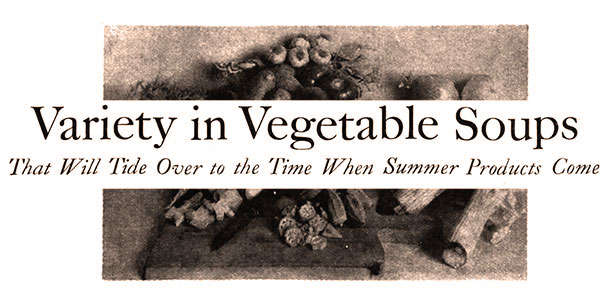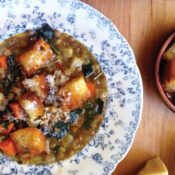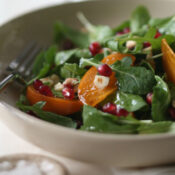In 1913, our cooks were talking variety in vegetable soups. Fifty years earlier, we were all about stewed meat: shin of beef, knuckle of veal, slice of ham, old fowl, and eye of newt. Okay, we’re kidding about that last one. But here are some delectable and curious soup recipes from our archive:
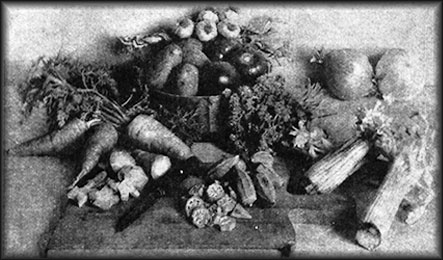
Variety in Vegetable Soups
By Dora B. Haines
Originally published in The Country Gentleman, May 17, 1913
It has been said that the essence of economy is a good soup. We Americans waste a good deal of material that might be converted into most palatable and nourishing soups. The recipes which follow are given because the materials used are nearly always at hand in practically every household. With a little skill ordinary material may be converted into a most delicious soup.
Soup #1 Vegetable Soup
To make a vegetable soup, the bone and scraps of meat left from a steak may be used for the stock or a 10-cent soup bone may be provided. This should be put on in a quart of cold water to which has been added a level teaspoonful of salt and cooked slowly for an hour and a half. Pare two or three good-sized potatoes and slice in the chopping bowl. Scrape one good-sized carrot and slice two medium-sized onions and a quarter of a small head of cabbage. Chop these all together until quite fine. Put these in the kettle with the meat and broth from it and cook, covered, over a very low flame at least an hour. Have soaked for three or four hours half a cupful of pearl barley. Add this to the kettle at the same time you do the vegetables. It will be necessary to add at least a pint of water, and possibly more, according peppercorns placed in the kettle with the meat give the soup a very distinct flavor. Some people use a bay leaf and a clove. The problem of seasoning is altogether a matter of individual taste.
Soup #2 Ham and Pea
Puree of pea soup is a very delicious and hearty soup, and the ease with which it may be made should be a recommendation for its more general use. Carefully look over and wash two cupfuls of dried peas. Soak overnight and in the morning place over a slow flame in a covered kettle. Cook until the peas are soft enough to put through a sieve. I always save the liquor in which a ham is boiled and always plan to have a pea soup at that time. To the puree I add three cupfuls of the ham liquor and cook very gently. You will need to add for seasoning a little pepper, half a teaspoonful of scraped onion and a teaspoonful of chopped parsley just before the soup is to be taken from the stove.
Soup #3 Kidney Bean
Beans make one of the heartiest soups. Soak two cupfuls of red kidney beans overnight and put them on to cook in the morning with an onion and a carrot and a bit of parsley. Cook slowly in a covered pot until the beans are tender enough to put through a sieve. To this puree add two cupfuls of soup stock and one cupful of boiling water. Season with salt, pepper, and half a teaspoonful of scraped onion and serve. This is especially good for luncheon where there are children. Two tablespoonfuls of tomato ketchup or chili sauce added to the beans give a flavor which adds real distinction to what might otherwise be an ordinary dish, if it were served often.
Soup #4 Creamy Potato and Bacon
Potato soup is another very hearty soup which I think will be welcomed generally by the children. To make it, cut up in small pieces three thin slices of bacon; slice very fine one medium-sized onion and cook in the bacon fat. Do not let it brown very much. Pare and cut up into dice four or five medium-sized potatoes, and place the bacon with the onion and fat together with the potatoes, in a kettle and add one quart of boiling water. Let this cook very gently until the potato is thoroughly done. Add a pint of milk. Cream together two level tablespoonfuls of butter and two level tablespoonfuls of flour and add to the kettle of soup. This will just make the contents of the kettle creamy, not thick. Toasted bread is an excellent accompaniment for this soup. Just to dress it up anew, I occasionally chop fine some of the tender yellow leaves from a stalk of celery and sprinkle these over each dish.
Soup #5 Creamed Onion
We do not often eat a creamed onion soup but it is most delicious, and because onions make so desirable a food we should use more of them in every possible way. This soup would lend variety. To make it chop finely four medium-sized onions and put them over the fire with three cupfuls of cold water and very little salt. Cook them until they are sufficiently tender to put through a sieve. Add the pulp and liquor left from the onion to one pint of cream sauce. Stir very carefully together and heat slowly for five or ten minutes. Then remove from the fire and just before the soup is taken to the table sprinkle a little chopped parsley over each plate.
Soup #6 Creamy Corn
This creams of corn soup is very delicately flavored. To make it take a can of corn and cook with a cupful of water for fifteen or twenty minutes over a very slow fire. Put the corn through a sieve and add the pulp to a pint of thin cream sauce. Season this with salt, a bit of paprika and add the chopped parsley before it is taken to the table. A dash of celery salt is advisable too. Toasted wafers are the best to serve with this soup.
Soup #7 Cream of Celery
Celery soup is one of those delectable dishes that may be made from what might otherwise be thrown away. I use for this the outer stalks and leaves that I cut from a bunch of celery in preparing for the table. I carefully wash it all, cut it up rather fine and put it in a kettle with three cupfuls of cold water. I add two peppercorns and half a bay leaf. These are cooked until the celery is tender and then the water is drained off. To a cupful of this juice I add one pint of cream sauce and heat thoroughly, seasoning with salt to taste.
The cream sauces should be rather thin for this. I whip half a cupful of cream and when each plate is ready for the table I put a spoonful of whipped cream on top, sprinkling over it a dash of paprika and a very little of the tender yellow leaves of the celery chopped very fine. A wafer just heated sufficiently to make it crisp is the best to serve with this soup. This is one of many cases in which a delicious dish may be prepared from those parts of a vegetable which are too often thrown into the garbage pail.
Soup #8 Tomato Soup
Another tomato soup which I serve very often is made by cooking an entire canful of tomatoes with a small onion cut up fine, two stalks of parsley, a little celery, and one green sweet pepper from which the seeds and white pulp have been removed, a bay leaf and two peppercorns. This should be cooked in a covered pot over a very slow fire for at least half an hour. Then put the entire contents of the pot through a sieve and add a cupful and a half or two cupfuls of boiling water, according to the amount of evaporation that has taken place. Soup stock may be used instead of the boiling water. If the tomatoes are very acidic that condition may be neutralized by adding a pinch of soda and a very tiny bit of sugar, perhaps a quarter of a teaspoonful.
Soup #9 Lima Bean with Sweet Pepper and Cheese Garnish
A cream soup of Lima beans is very delicious and very easily made. Soak a cupful of Lima beans overnight, put them on in cold water and cook until tender over a slow fire. When they are thoroughly cooked put through a sieve. Add the purée of beans to a pint of thin cream sauce, seasoning with salt and a dash of paprika.
When this is ready to take to the table I have chopped very fine a sweet pepper from which the seeds and white pulp have been removed. This I serve sprinkled over the top, together with a teaspoonful to each plate of dry cheese finely grated.
Soup #10 Mock Bisque
Mock bisque or cream tomato soup is probably more generally liked than any other soup made. My recipe for this is to stew half a canful of tomatoes for five minutes and then put them through the sieve, adding a level teaspoonful of salt, an eighth of a teaspoonful of paprika, half a teaspoonful of sugar and a pinch of soda. I make a pint of cream sauce and stir this tomato puree into it while both are hot. This soup should always have served with it croutons, which are small toasted squares of bread.
Tip: To make the cream sauce used in soups above (#8 and #9), place two level tablespoonfuls of butter in a stew pan and bring to the boiling point, but be very careful not to brown it ever so little. Stir into this two level tablespoonfuls of flour and half a teaspoonful of salt. Cook the flour until it bubbles and then slowly add one pint of milk and stir very carefully until all is of the consistency of thick cream and free from lumps. If any of the butter stays on top of the cream sauce it is not cooked sufficiently and should be left on the stove a little longer.
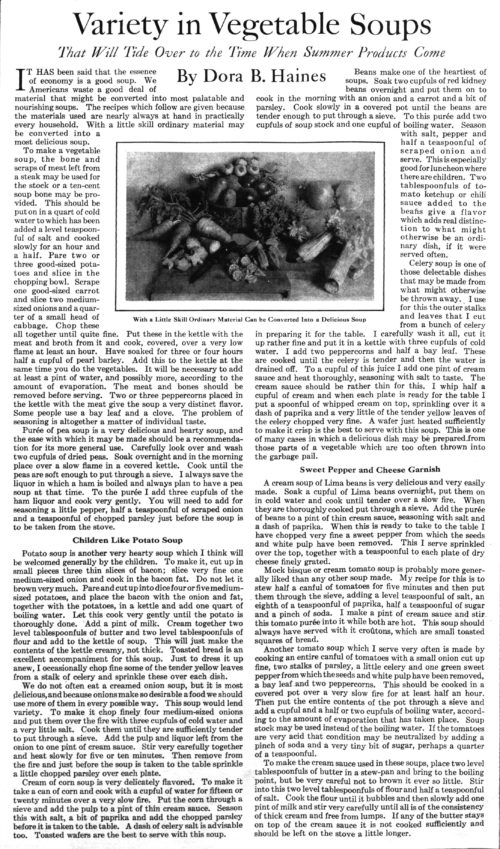
Click to Enlarge
Bonus Recipes from 1868
Originally published in The Saturday Evening Post, October 24, 1868
#11 Gravy Soup
Nothing is better than shin of beef for this soup, though pieces of the rump and other parts are used; the shin should be sawed in several places, and the marrow extracted; this, if laid in the bottom of the saucepan, will take the place of butter; if marrow is not forthcoming, butter must be employed; take a fourth of the quantity of ham, stew gently until the gravy is extracted, care being taken it does not burn; a little water may be employed by the inexperienced, but not much; when it has nearly dried up again, put in herbs, a couple of carrots cut very small, pepper ground, salt a little white sugar (this can be omitted, but it materally adds to the flavor;) add boiling water in requisite quantity, and stew gently for five hours; when cold, remove the fat, and warm up as wanted.
#12 White Soup
General directions for white stock have been given, but to prevent mistake, take a knuckle of veal, separated into three or four pieces, a slice of ham as lean as possible, a few onions, thyme, cloves, and mace, stew twelve or fourteen hours, until the stock is as rich as the ingredients can make it; an old fowl will make it much richer, if added. This soup must be made the day before it is required; when removed from the fire, after sufficiently stewed, let it cool, and then remove the fat, add to it four ounces of pounded blanched almonds, let it boil slowly, thicken it with half a pint of cream and an egg; it should boil slowly for half an hour.
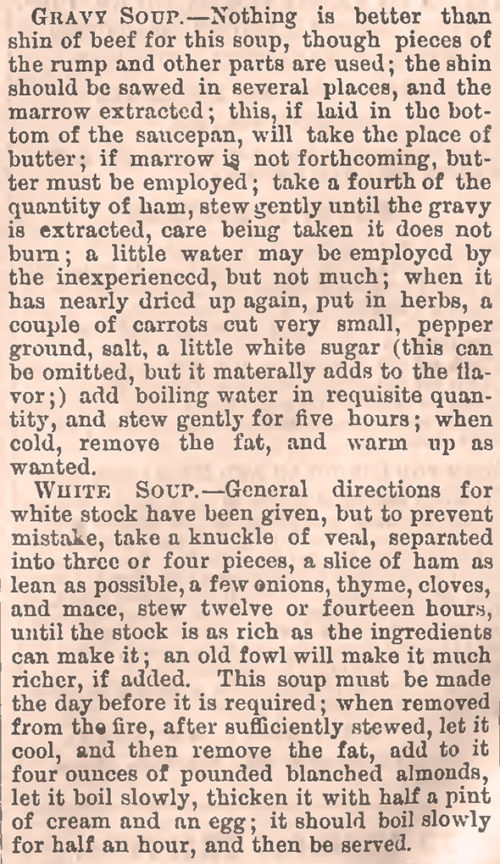
Click to Enlarge
Become a Saturday Evening Post member and enjoy unlimited access. Subscribe now
